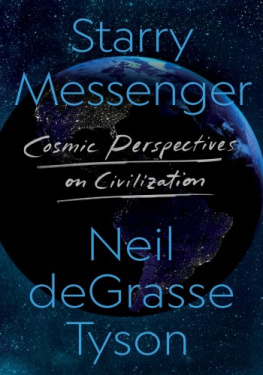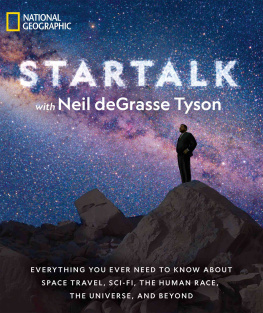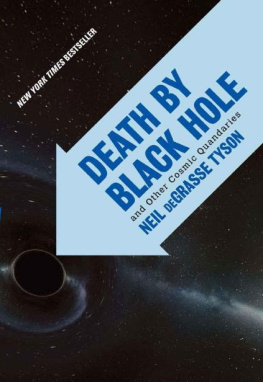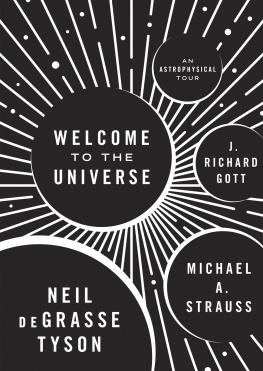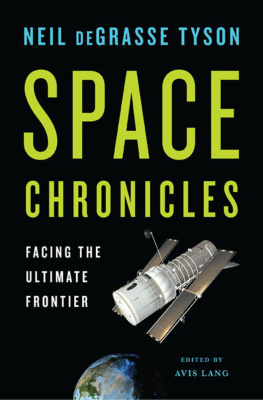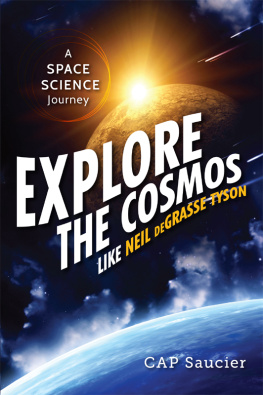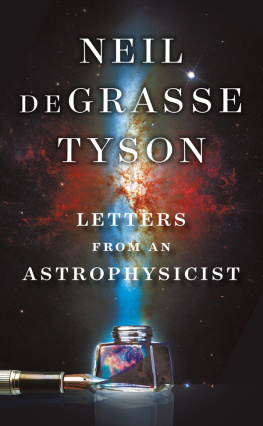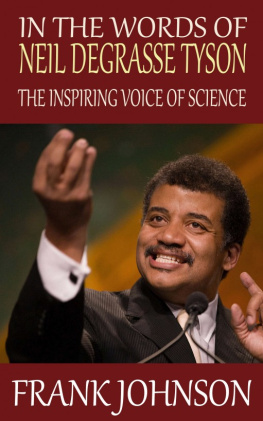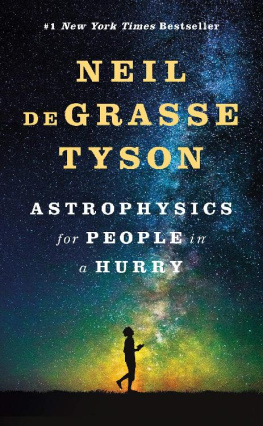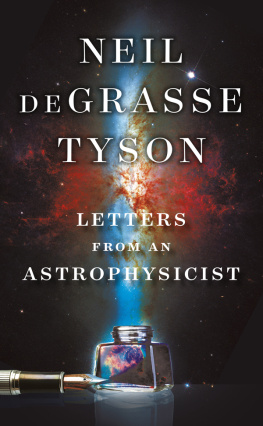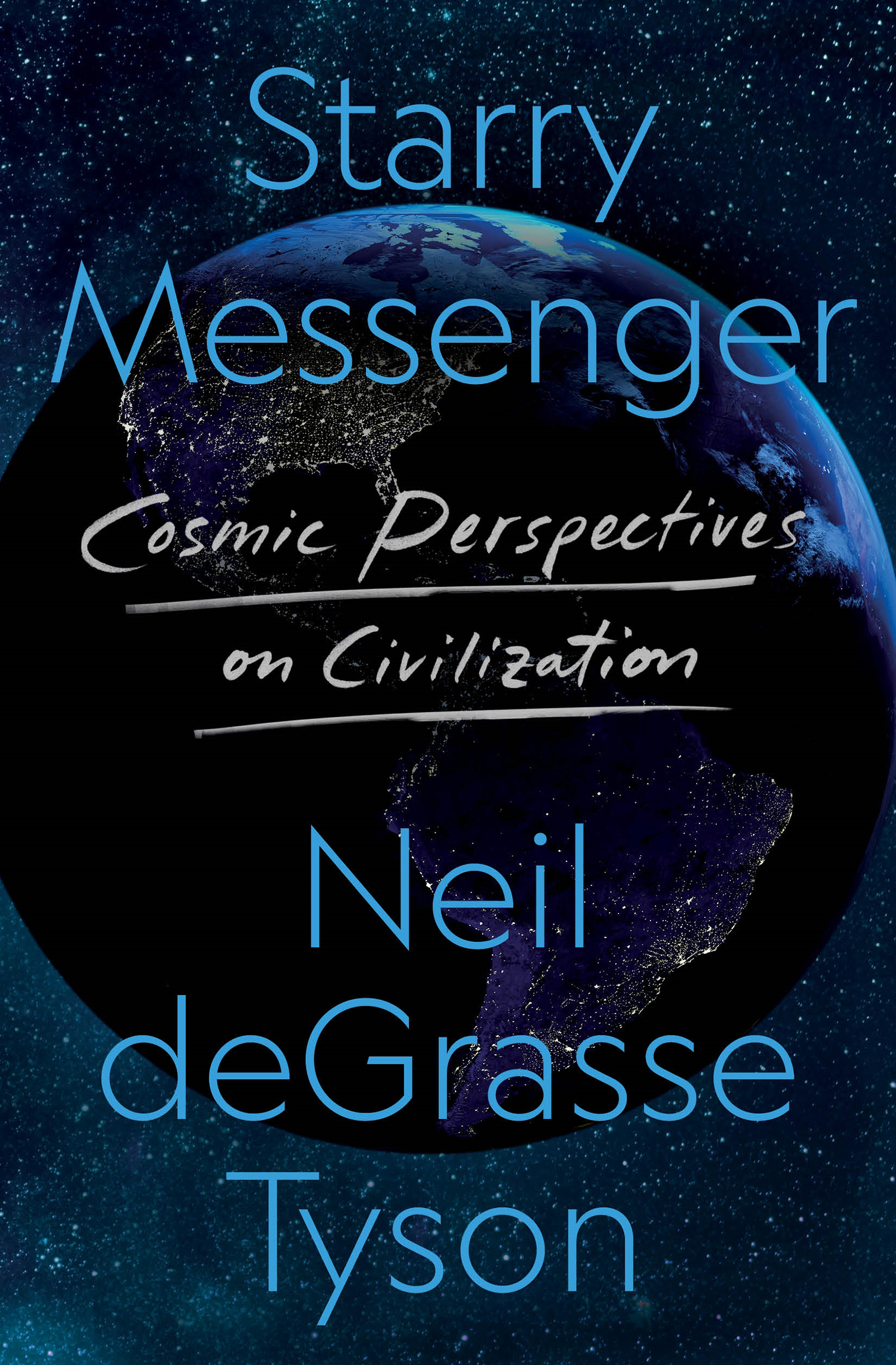Contents
Guide
Pagebreaks of the print version

The author and publisher have provided this e-book to you for your personal use only. You may not make this e-book publicly available in any way. Copyright infringement is against the law. If you believe the copy of this e-book you are reading infringes on the authors copyright, please notify the publisher at: us.macmillanusa.com/piracy.
Dedicated to the memory of Cyril DeGrasse Tyson
and all others who want to see the world
as it could be, rather than as it is.
You develop an instant global consciousness, a people orientation, an intense dissatisfaction with the state of the world, and a compulsion to do something about it.
From out there on the Moon, international politics look so petty. You want to grab a politician by the scruff of the neck and drag him a quarter of a million miles out and say,
Look at that, you son of a bitch.
Edgar D. Mitchell, Apollo 14 astronaut
Starry Messenger is a wake-up call to civilization. People no longer know who or what to trust. We sow hatred of others fueled by what we think is true, or what we want to be true, without regard to what is true. Cultural and political factions battle for the souls of communities and of nations. Weve lost all sight of what distinguishes facts from opinions. Were quick with acts of aggression and slow with acts of kindness.
When Galileo Galilei published Sidereus Nuncius in 1610, he brought to Earth cosmic truths that had been waiting since antiquity to descend upon human thought. Galileos freshly perfected telescope revealed a universe unlike anything people presumed to be true. Unlike anything people wanted to be true. Unlike anything people dared say was true. Sidereus Nuncius contained his observations of the Sun, Moon, and stars, as well as the planets and the Milky Way. Two fast takeaways from his book: (1) human eyes alone are insufficient to reveal fundamental truths about the operations of nature, (2) Earth is not the center of all motion. It orbits the Sun as just one among the other known planets.
Sidereus Nuncius translates from the Latin to Starry Messenger.
These first-ever cosmic perspectives in our world were ego checks on our self-importancemessages from the stars forcing people to rethink our relationships to one another, to Earth, and to the cosmos. We otherwise risk believing the world revolves around us and our opinions. As an antidote, Starry Messenger offers ways to allocate our emotional and intellectual energies that reconcile with the biology, chemistry, and physics of the known universe. Starry Messenger recasts some of the most discussed and debated topics of our timeswar, politics, religion, truth, beauty, gender, race, each an artificial battlefield on the landscape of lifeand returns them to the reader in ways that foster accountability and wisdom in the service of civilization. I also intermittently explore how we might appear to space aliens who arrive on Earth with no preconceived notions of who or what we areor how we should be. They serve as impartial observers of our mysterious ways, as they highlight inconsistencies, hypocrisies, and occasional idiocies in our lives.
Think of Starry Messenger as a trove of insights, informed by the universe and brought to you by the methods and tools of science.
When people disagree in our complex world of politics, religion, and culture, the causes are simple, even if the resolutions are not. We all wield different portfolios of knowledge. We possess different values, different priorities, and different understandings of all that unfolds around us. We see the world differently from one another, and by doing so, we construct tribes based on who looks like us, who prays to the same gods as we do, and who shares our moral code. Given the longtime Paleolithic isolation within our species, perhaps we should not be surprised by what evolution has wrought. Groupthink, even when it defies rational analysis, may have conferred survival advantages to our ancestors.
If we instead back away from all that divides us, you might find common, unifying perspectives on the world. If so, watch where you step. That new vista is neither north nor south nor east nor west of where you stand. In fact, the place exists nowhere on the compass rose. One must ascend from Earths surface to get thereto see Earth, and everybody on it, in a way that leaves you immune to provincial interpretations of the world. We speak of this transformation as the overview effect, commonly experienced by astronauts who have orbited Earth. Add to this the discoveries of modern astrophysics as well as the math, science, and technology that birthed space exploration, and yes, a cosmic perspective is literally above it all.
Nearly every thought, every opinion, and every outlook I formulate on world affairs has been touchedinformed and enlightenedby knowledge of our place on Earth and of our place in the universe. Far from being a cold, feelingless enterprise, there is, perhaps, nothing more human than the methods, tools, and discoveries of science. They shape modern civilization. What is civilization, if not what humans have built for themselves as a means to transcend primal urges and as a landscape on which to live, work, and play.
What then of our collective and persistent disagreements? All I can promise is that whatever opinions you currently hold, an infusion of science and rational thinking can render them deeper and more informed than ever before. This path can also expose any unfounded perspectives or unjustified emotions you may carry.
One cant realistically expect people to argue in the same way scientists do among themselves. Thats because scientists are not in search of each others opinions. Were in search of each others data. Even when arguing opinions, you may be surprised how potent a rational perspective can be. When illuminated by it, you fast discover that Earth supports not many tribes, but only onethe human tribe. Thats when many disagreements soften, while others simply evaporate, leaving you with nothing to argue about in the first place.
Science distinguishes itself from all other branches of human pursuit by its power to probe and understand the behavior of nature on a level that allows us to predict with accuracy, if not control, the outcomes of events in the natural world. Scientific discovery often carries the power to broaden and deepen perspectives on all things. Science especially enhances our health, wealth, and security, which are greater today for more people on Earth than at any other time in human history.
The scientific method, which underpins these achievements, is often conveyed with formal terms that reference induction, deduction, hypothesis, and experiment. But it can be summarized in one sentence, which is all about objectivity:
Do whatever it takes to avoid fooling yourself into believing that something is true when it is false, or that something is false when it is true.
This approach to knowing enjoys taproots in the eleventh century, as expressed by the Arabic scholar Ibn al-Haytham (AD 9651040), also known as Alhazen. In particular, he cautioned the scientist against bias: He should also suspect himself as he performs his critical examination of it, so that he may avoid falling into either prejudice or leniency. By the seventeenth century, shortly after the near-simultaneous inventions of both the microscope and the telescope, the scientific method would fully bloom, propelled by the work of astronomer Galileo and philosopher Sir Francis Bacon (Lord Verulam). In short, conduct experiments to test your hypothesis and allocate your confidence in proportion to the strength of your evidence.


